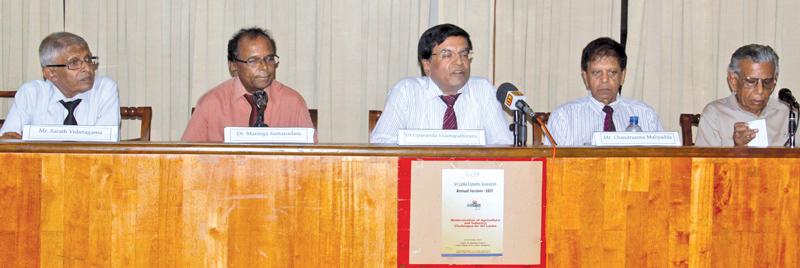
The growth potential of Sri Lanka’s Agriculture and Industry sectors has largely been under-tapped during the last four decades, mainly due to low productivity in these sectors combined with policy inconsistencies adopted by subsequent authorities in charge, top academia from a policy think tank opines.
Addressing a press conference to announce the forthcoming 2017 Annual Sessions of the Sri Lanka Economic Association (SLEA) last week, SLEA President, Dr. Upananda Vidanapathirana said SLEA is of the view that the growth potential of agriculture and industry sectors has not been exploited adequately for the country’s economic development.
“The key question that begs an answer is whether we have been using the right kind of policies for land utilization in agriculture and are providing the right investment package for foreign or local funding agencies towards development or whether there needs to be a change here,” Vidanapathirana said. At the end of 2016, the contribution from the agriculture, forestry and fishing sectors as a percentage of Gross Domestic Product (GDP) declined from 7.8% in 2015 to 7.1% in 2016 while the contribution from the industries sector improved marginally from 26.2% in 2015 to 26.8% in 2016.
“It is a fact that although 40% of Sri Lanka’s population is dependent on agriculture, it contributes very little to the island’s overall GDP while the contribution from industries is still stagnant.
“However, this situation is different when one compares with the newly industrialized countries such as Singapore, South Korea, Taiwan and Hong Kong and the emerging economies such as Thailand and Malaysia. These economies have achieved a sustained high economic growth driven by the contribution from all three sectors,” the SLEA President pointed out. Meanwhile, SLEA Vice President, Raja M Korale warned that based on Sri Lanka’s population distribution, it would not be easy for the country to sustain a high period of economic growth largely driven by the services industry in the long run. Hence, he noted it is high time to address issues in the real sector.
“With a sound base for a diversified agricultural sector, Sri Lanka needs to increase productivity through innovation, commercialization and diversification of agriculture thereby creating more avenues for value-added industrial products for exports,” the economists attached to the SLEA said.
